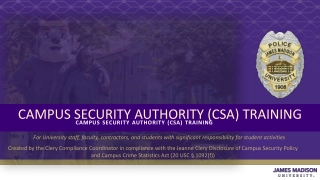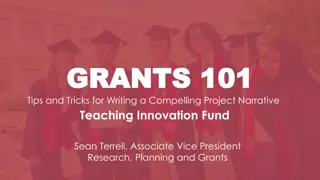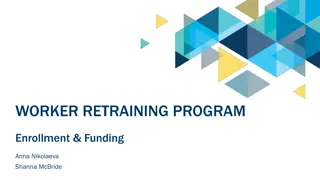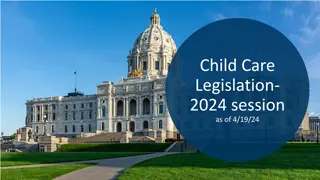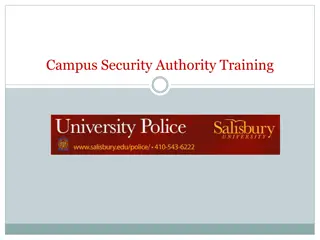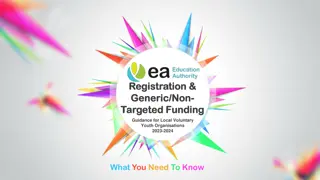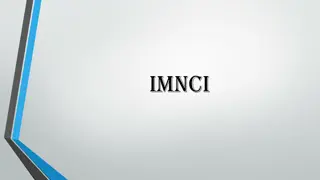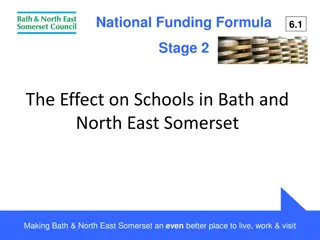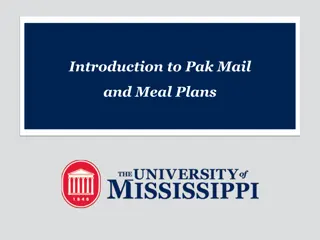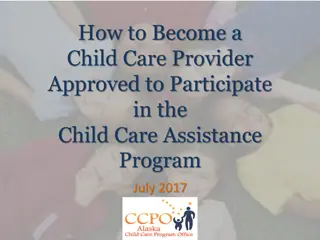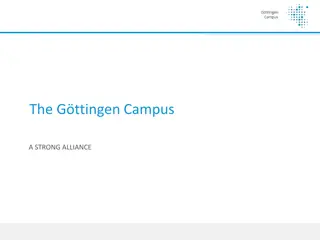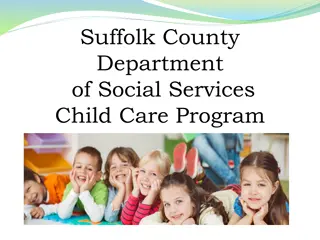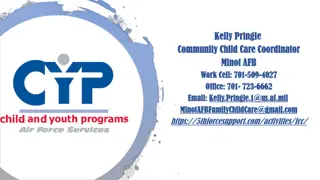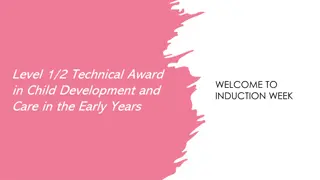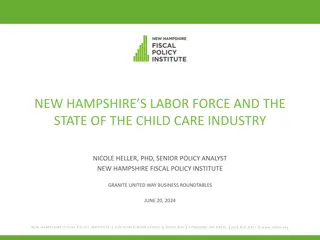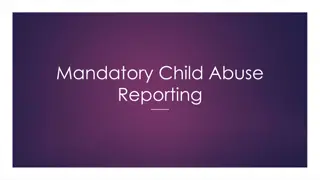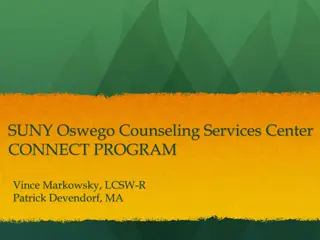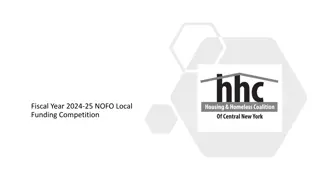CCAMPIS Program Overview: Funding Opportunities for Campus-Based Child Care Services
The CCAMPIS program, authorized under the Higher Education Act of 1965, supports low-income parents in postsecondary education by providing campus-based child care services. Institutions of higher education that received $250,000 or more in Federal Pell Grant funds in FY 2022 are eligible to apply for grants up to $500,000 annually. The program emphasizes the establishment of child care programs catering to low-income students and offers services like before and after school care. CCAMPIS aims to facilitate parental participation in higher education by addressing child care needs.
Uploaded on May 16, 2024 | 2 Views
Download Presentation

Please find below an Image/Link to download the presentation.
The content on the website is provided AS IS for your information and personal use only. It may not be sold, licensed, or shared on other websites without obtaining consent from the author. Download presentation by click this link. If you encounter any issues during the download, it is possible that the publisher has removed the file from their server.
E N D
Presentation Transcript
FY 2023 Child Care Access Means Parents In School (CCAMPIS) Program Pre-Application Workshop U.S. Department of Education, Washington D.C. June 14, 2023
Welcome and Agenda Introductions FY 2023 Competition Highlights Selection Criteria Application Formatting and Submission Questions and Answers
Disclaimer This document is a brief summary of the program statute and application requirements. Do not rely solely on the information in this document. Please refer to the Notice Inviting Applications published in the Federal Register for additional information, as that is the official document governing the competition.
CCAMPIS Competition Highlights Four (4) year grant awards Priorities: Absolute Competitive Invitational CCAMPIS Program Profile Form Indirect Cost Rate
CCAMPIS Legislation and Purpose Authorizing Legislation Chapter 28, Subchapter IV, Part A, Subpart 7(20) U.S.C. 1070e of the Higher Education Act of 1965, as amended. Program Purpose to support the participation of low-income parents in postsecondary education through the provision of campus-based childcare services .
Whos Eligible to Apply Institutions of higher education (IHEs) that during FY 2022 awarded a total of $250,000 or more Federal Pell Grant funds to students enrolled at their institutions. Currently Funded CCAMPIS grantees, may not apply in the FY 2023 competition
CCAMPIS Funding Levels Current Program Appropriation: $75,000,000 Estimated Available funds:$13,600,000 Maximum Grant Funding Levels The maximum annual amount an applicant may receive under this program for a 12-month budget period is $500,000 or the amount equivalent to the product of $100 multiplied by the institution s number of Pell recipients in FY 2022, whichever amount is greater.
CCAMPISServices CCAMPIS funds may be used to: Provide campus-based child care services to low-income students; Establish a campus-based child care program primarily serving the needs of low-income students; and Provide before and after school services. Additional Services May Include: Child care subsidies; personnel costs; travel for professional development; supplies and equipment; and/or minor renovations and repairs.
Absolute Priorities Absolute Priority 1: Leverage significant local or institutional resources, including in-kind contributions, to support the activities assisted. Absolute Priority 2: Utilize a sliding fee scale for child care services provided in order to support a high number of low- income parents pursuing postsecondary education at the institution.
CompetitivePreference Priority Strengthening Cross-Agency Coordination and Community Engagement to Advance Systemic Change (up to 5 points). Projects that are designed to take a systemic evidence- based approach to improving outcomes for underserved students in coordinating efforts with Federal, State, or local agencies, or community-based organizations, that support students, to address child care.
InvitationalPriorities Invitational Priority 1 is a priority in which the Secretary invites applicants to provide information regarding supporting students who are single parents receiving services through the CCAMPIS grant. Invitational Priority 2: is a priority in which the Secretary invites applicants to provide information regarding increasing the quality of campus-based child care for low-income student parents.
Invitational Priorities slide2 Invitational Priority 3: is a priority in which the Secretary invites applicants to provide information regarding Providing Wrap-Around Services for Low-Income Parents in Postsecondary Education.
Selection Criteria Maximum Points (24 points) (36 points) (21 points) (12 points) ( 7 points) 1. Need for the Project 2. Quality of Project Design 3. Quality of Management Plan 4. Quality of Project Evaluation 5. Adequacy of Resources 6. Competitive Preference Priority ( 5 Points) _________ Total Maximum Score (105 points)
Need for the Project (Maximum 24 points) All applicants must address the following: In determining the need for the proposed project, the Secretary considers: a. Information regarding student demographics. b. An assessment of child care capacity on or near campus. c. Information regarding the existence of waiting list or existing child care. d. Information regarding additional needs created by concentrations of poverty or by geographic isolation. e. Other relevant data
Quality of Project Design (Maximum 36 Points) Applicants must describe the activities to be assisted with CCAMPIS funding and must specify whether the grant funds will support an existing child care program or a new child care program.
Quality of Project Design continued Existing: You currently have a child care center that provides child care services for the student-parents that attend your institution. New: You do not have a child care center that provides child care services for the student-parents that attend your institution.
Quality of Project Design slide 3 All applicants must address the following: The extent to which the applicant describes in its application the activities to be assisted and whether the grant funds will support an existing child care program or a new child care program. The extent to which the services to be provided by the proposed project are focused on those with the greatest needs. The likely impact of the services to be provided by the proposed project on the intended recipients of those services.
Quality of Project Design slide 4 The extent to which the application includes an assurance that the institution will meet the child care needs of low-income students through the provision of services, or through a contract for the provision of services. The extent to which the child care program will coordinate with the institution's early childhood education curriculum, to the extent the curriculum is available, to meet the needs of the students in the early childhood education program at the institution, and the needs of the parents and children participating in the child care program assisted under this section. The extent to which the proposed project encourages parental involvement.
Quality of Project Design slide 5 ONLY applicants requesting grant assistance for new child care programs must: (a) The extent to which the applicant provides in its application a timeline, covering the period from receipt of the grant through the provision of the child care services, delineating the specific steps the institution will take to achieve the goal of providing low-income students with child care services. (b) The extent to which the applicant specifies in its application the measures the institution will take to assist low-income students with child care during the period before the institution provides child care services. (c) The extent to which the application includes a plan for identifying resources needed for the child care services, including space in which to provide child care services and technical assistance if necessary.
Quality of Management Plan (Maximum 21 Points) All applicants must address the following: The extent to which the application includes a management plan that describes the resources, including technical expertise and financial support, the institution will draw upon to support the child care program and the participation of low-income students in the program, such as accessing social services funding, using student activity fees to help pay the costs of child care, using resources obtained by meeting the needs of parents who are not low-income students, and accessing foundation, corporate or other institutional support, and demonstrates that the use of the resources will not result in increases in student tuition. The qualifications, including relevant training and experience of key project personnel.
Quality of Management Plan-continued The adequacy of the management plan to achieve the objectives of the proposed project on time and within budget, including clearly defined responsibilities, timelines, and milestones for accomplishing project tasks.
Quality of Project Evaluation (Maximum 12 Points) All applicants must address the following: In determining the quality of the project evaluation, the Secretary considers the following: 1. The extent to which the methods of evaluation are thorough, feasible, and appropriate to the goals, objectives, and outcomes of the proposed project. 2. The extent to which the methods of evaluation include the use of objective performance measures that are clearly related to the intended outcomes of the project and will produce quantitative and qualitative data to the extent possible. 3. The extent to which the methods of evaluation will provide performance feedback and permit periodic assessment of progress toward achieving intended outcomes.
Adequacy of Resources (Maximum 7 points) All applicants must address the following: In determining the adequacy of resources for the proposed project, the Secretary considers the following: 1. The extent to which the budget is adequate to support the proposed project. 2. The extent to which the costs are reasonable in relation to the number of persons to be served and to the anticipated results and benefits.
Submission Highlights FY 2023 CCAMPIS applications must be submitted electronically using Grants.gov. Acquaint yourself with the requirements of Grants.gov early as the registration procedures may require five (5) or more days to complete. Grants.gov is accessible through its portal page at: http:// www.grants.gov. SAM Update The recommended page limit for Part III, Application Narrative of the application is 50 pages.
Grants.gov Applicants must submit using Grants.gov Grants.gov registration involves many steps including registration on SAM (www.sam.gov) which may take approximately one week to complete, but could take upwards of several weeks to complete, depending upon the completeness and accuracy of the data entered into the SAM database by an applicant. REGISTER EARLY Applicants may begin working on application while completing registration. BUT, applicants can not submit until all registration steps are complete. Save (on your computer) often while working on your application. Grants.gov details are available at: http://www.grants.gov/GetStarted Grants.gov Customer service: 1-800-518-4726
Exception to Electronic Submission You may qualify for an electronic submission waiver if: You do not have Internet access You do not have the capacity to upload large documents to the Grants.gov system
Exception to Electronic Submission slide 2 If you are submitting an exception request, you must: Mail or fax a written statement to the Department explaining your need to submit a paper application based on the two grounds for an exception. If mailing, your written statement must be POSTMARKED no later than two weeks (14 calendar days) before the application deadline date. If faxing, your written statement must be RECEIVED no later than two weeks (14 calendar days) before the application deadline date.
Exception to Electronic Submission slide 3 Submit all Electronic Submission Waivers to: James Davis U.S. Department of Education 400 Maryland Avenue, SW Room 268-02 Washington, DC 20202-4260 Fax Number: 202-453-5780 Note: Paper applications submitted without an approved waiver will not be considered.
Reasons For Application Rejection We do not consider an application that does not comply with the deadline requirements. Hard copy application submitted without an approved waiver.
Tips to Submit Successfully Review Application Notices & instructions carefully Register early Submit early Applications received by Grants.gov are date- and time-stamped upon submission. Your application must be fully uploaded and submitted and must be date- and time-stamped by the Grants.gov system no later than 11:59:59 p.m., Eastern Time, on the application deadline date. Verify your application has submitted completely. Save and keep your own copy. Receive e-mail confirmation. Note: only PDF or WORD file types will be accepted.
Further Information Website for Child Care Access Means Parents in School Program: http://www2.ed.gov/programs/campisp/index.html Program Contacts: Harold Wells II 202-453-6131 Harold.Wells@ed.gov Allysia.Mompoint@ed.gov Allysia Mompoint (202)-987-1905
CCAMPIS GOOD LUCK!!!

 undefined
undefined

